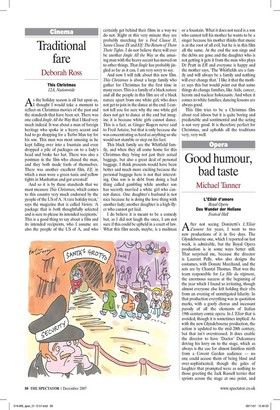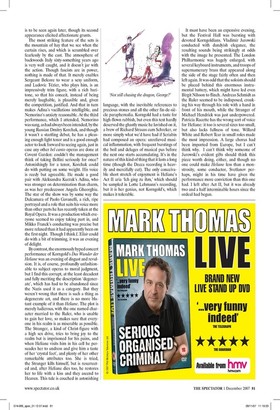Good humour, bad taste
Michael Tanner L'Elisir d'amore Royal Opera Das Wunder der Heliane Festival Hall After not seeing Donizetti's L'Elisir d'amore for years, I went to two new productions of it in five days. The Glyndebourne one, which I reported on last week, is admirable, but the Royal Opera production is in some ways better still. That surprised me, because the director is Laurent Pelly, who also designs the costumes, with Donate Marchand, and the sets are by Chantal Thomas. That was the team responsible for La fille du regiment, the enormous success at the beginning of the year which I found so irritating, though almost everyone else left holding their ribs from an evening of unmitigated hilarity. In that production everything was in quotation marks, with a goofy chorus and incessant parody of all the elements of Italian 19th-century comic opera. In L'Elisir that is avoided, though it is sometimes implied. As with the new Glyndebourne production, the action is updated to the mid-20th century, but that isn't overstressed. It does enable the director to have 'Doctor' Dulcamara driving his lorry on to the stage, which as always is the cue for almost limitless mirth from a Covent Garden audience — no one could accuse them of being blasé and over-sophisticated; though the gales of laughter that prompted were as nothing to those greeting the Jack Russell terrier that sprints across the stage at one point, and is to be seen again later, though its second appearance elicited affectionate grunts.
The most striking feature of the sets is the mountain of hay that we see when the curtain rises, and which is scrambled over fearlessly by the cast. The atmosphere of backwoods Italy sixty-something years ago is very well caught, and it doesn't jar with the action. Though fascists are in power, nothing is made of that. It merely enables Sergeant Belcore to wear a sexy uniform, and Ludovic Tezier, who plays him, is an impressively trim figure, with a rich baritone, so that his conceit, instead of being merely laughable, is plausible and, given the competition, justified. And that in turn makes Adina's vacillations intelligible, and Nemorino's anxiety reasonable. At the third performance, which I attended, Nemorino was sung, as had always been intended, by the young Russian Dmitry Korchak, and though it wasn't a startling debut, he has a pleasing enough light tenor and is a good enough actor to look forward to seeing again, just in case any other bel canto operas are done at Covent Garden: couldn't the management think of taking Bellini seriously for once? Astonishingly for a tenor, Korchak could do with putting on some weight. His voice is reedy but agreeable. He made a good pair with Aleksandra Kurzak's Adina, who was stronger on determination than charm, as was her predecessor Angela Gheorghiu. The star of the show was by some way the Dulcamara of Paolo Gavanelli, a rich, ripe portrayal and a role that suits his voice more than other parts he has recently taken at the Royal Opera. It was a production which everyone seemed to enjoy taking part in, and Mikko Franck's conducting was precise but more relaxed than it had apparently been on the first night. Though I think L 'Elisir could do with a bit of trimming, it was an evening of delight.
By contrast, the enormously hyped concert performance of Korngold's Das Wunder der Heliane was an evening of disgust and revulsion. It is, of course, profoundly unfashionable to subject operas to moral judgment, but I find this corrupt, at the least decadent and fully meriting the description 'degenerate', which has had to be abandoned since the Nazis used it as a category. But they weren't wrong that there is such a thing as degenerate art, and there is no more blatant example of it than Heliane. The plot is merely ludicrous, with the one named character married to the Ruler, who is unable to gain her love, so makes sure that everyone in his realm is as miserable as possible. The Stranger, a kind of Christ-figure with a high sex drive, tries to bring joy to the realm but is imprisoned for his pains, and when Heliane visits him in his cell he persuades her to undress and give him a taste of her 'crystal feet', and plenty of her other remarkable attributes too. She is tried, the Stranger kills himself, but is resurrected and, after Heliane dies too, he restores her to life with a kiss and they ascend to Heaven. This tale is couched in astonishing language, with the inevitable references to precious stones and all the other fin-de-siè- cle paraphernalia. Korngold had a taste for high-flown rubbish, but even this text hardly deserved the ghastly music he lavished on it, a brew of Richard Strauss cum Schreker, or more simply what we'd have had if Scriabin had composed an opera: unrelieved musical inflammation, with frequent burstings of the boil and deluges of musical pus before the next one starts accumulating. It's in the nature of this kind of thing that it lasts a long time (though the Decca recording is heavily and mercifully cut). The only conceivable short stretch of enjoyment is Heliane's Act II aria `Ich ging zu ihm,' which should be sampled in Lotte Lehmann's recording, but it is her genius, not Korngold's, which makes it tolerable.
It must have been an expensive evening, but the Festival Hall was bursting with devoted Korngoldians. Vladimir Jurowski conducted with dandyish elegance, the resulting sounds being strikingly at odds with the image he presented. The London Philharmonic was hugely enlarged, with several keyboard instruments, and troops of supernumerary brass that appeared along the side of the stage fairly often and then left again. It was odd that the soloists should be placed behind this enormous instrumental battery, which might have led even Birgit Nilsson to flinch. Andreas Schmidt as the Ruler seemed to be indisposed, croaking his way through his role with a hand in front of his mouth, while the Stranger of Michael Hendrick was just underpowered. Patricia Racette has the wrong sort of voice for Heliane: it too is several sizes too small, but also lacks fullness of tone. Willard White and Robert Tear in small roles made the most impression. A large chorus had been imported from Europe, but I can't think why. I can't think why someone of Jurowski's evident gifts should think this piece worth doing, either, and though no one could make Heliane less than a monstrosity, some conductor, Svetlanov perhaps, might in his time have given the performance more conviction than this one had. I left after Act II, but it was already two and a half interminable hours since the ordeal had begun.






































































 Previous page
Previous page